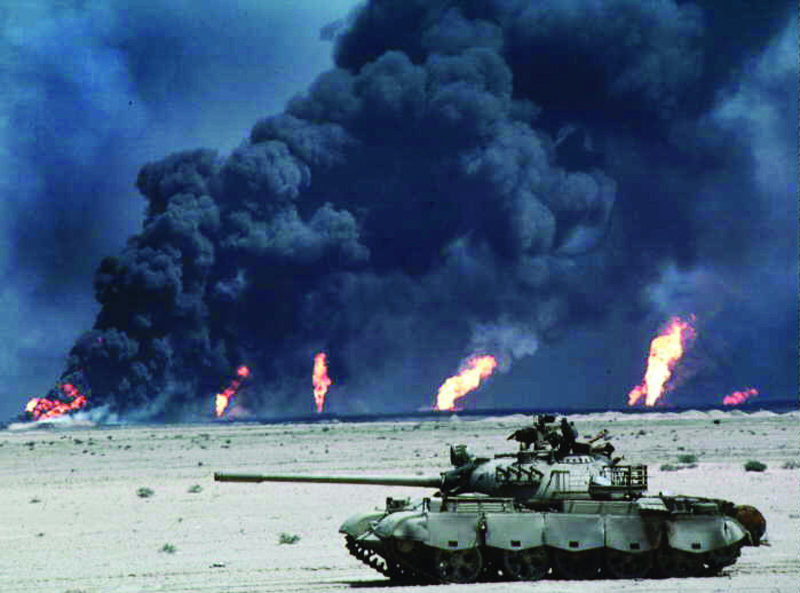 KUWAIT: An archive photo from the Iraqi invasion period showing heavy plumes of smoke billowing from burning oil wells in Kuwait. - KUNA
KUWAIT: An archive photo from the Iraqi invasion period showing heavy plumes of smoke billowing from burning oil wells in Kuwait. - KUNA
KUWAIT: Though humanity has always counted its war casualties in terms of dead and wounded soldiers and civilians, destroyed cities and livelihoods, the environment has often remained the unpublicized victim of war. Water wells have been polluted, crops torched, forests cut down, soils poisoned, and animals killed to gain military advantage. Unquestionably, as the world marked the International Day for Preventing the Exploitation of the Environment in War and Armed Conflict on Friday, the Iraqi invasion of Kuwait in 1990 is an unequivocal and clear-cut paradigm in this regard.
The Iraqi invasion had wreaked havoc on everything in Kuwait, primarily its environment and nature, by setting oilfields ablaze, devastating farmland, green areas and nature reserves, and planting mines in the desert. Nevertheless, Kuwait, with the strong will and determination of its leadership and people, could trounce the impacts of the Iraqi invasion by launching environment rehabilitation programs and blueprints using cutting-edge technology and sophisticated means.
Two million mines
On the occasion of the International Day for Preventing the Exploitation of the Environment in War and Armed Conflict, the Environmental Public Authority's Biodiversity Conservation Department Director Lina Al-Awadhi said wars and armed conflicts do not only kill people and destroy their property, but also seriously damage the environment involving its desert, air and biological elements. Kuwait's environment, for instance, was egregiously affected by the ramifications of wars and armed conflicts, with the Iraqi invasion having totally ruined the soil, which is the key element of the Kuwaiti environment, she said.
Kuwait had lost its biodiversity and biological environment due to the devastation of its surface soil, encompassing fungus and organic substances, and the planting of mines in desert areas nationwide, she lamented. The defunct Iraqi regime had planted as many as two million mines in Kuwait's desert and coasts, she said, sounding the alarm that mine explosions cause heavy casualties and soil pollution which, as a matter of course, affects natural, chemical and biological characteristics, not to mention the loss of biodiversity. However, the Environmental Public Authority, with all its departments, is doing a great job in restoring the natural elements of Kuwait's environment and attaches much significance to environment rehabilitation projects and programs, added Al-Awadhi.
Meanwhile, Kuwait Environmental Protection Society Chairman Wajdan Al-Eqab reminded that the late Amir Sheikh Sabah Al-Ahmad Al-Jaber Al-Sabah had adopted the initiative of the Kuwaiti civil society to prevent the use of environment in wars and conflicts and had exerted great diplomatic efforts in this regard at the United Nations (UN) 21 years back.
She elaborated that when the UN General Assembly recognized November 6 of each year as the International Day for Preventing the Exploitation of the Environment in War and Armed Conflict, it was the outcome of over 50 countries' approval of a draft resolution forwarded by the State of Kuwait to the UNGA. By so doing, the Kuwaiti civil society had sought to get a UN stance against the damage to the environment due to wars and conflicts, and to highlight the great efforts exerted in order to set out burning oil wells in Kuwait, she said.
Worst environmental disaster
Eqab recalled that the State of Kuwait had seen the worst environmental disaster in modern history during the Iraqi invasion as 1,037 oil wells were destroyed, causing serious air pollution nationwide. However, she maintained, Kuwait has been leaving no stone unturned to overcome the huge environmental damage triggered by the burning of oil wells.
Kuwaiti Water Association Chairman Dr Saleh Al-Muzaini regretted that the Iraqi occupation army had destroyed most of the country's power and water stations before looting equipment and machines used there. But, following the liberation of Kuwait, several new water desalination stations have been set up in the country, he said, boasting that Kuwait is now placed first in the Arab world and sixth worldwide in terms of water quality.
On November 5, 2001, the UN General Assembly declared November 6 of each year as the International Day for Preventing the Exploitation of the Environment in War and Armed Conflict. On the day discussions about how the effects of war are damaging to the natural environment take place. People also work together to find ways to limit environmental destruction caused by armed conflict and war. Speeches, lectures, media coverage, and related classroom activities in schools are some of the events that take place on this day. - KUNA




